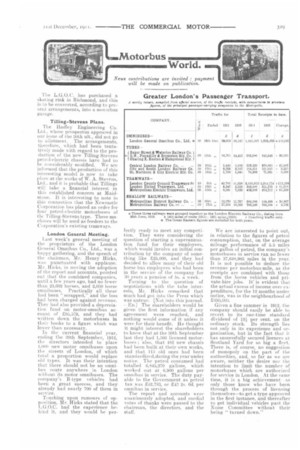Motorbus World.
Page 9

If you've noticed an error in this article please click here to report it so we can fix it.
News contribution. are invited : payment will be made on publication.
The L.G.O.C. has purchased a skating rink in Richmond, and this is to be converted, according to pm.sent arrangentents, into a motorbus
,arage.
Tilling-Stevens Plans.
The Hadley Engineering Co. Ltd.. whose prospectus appeared in our issue of the 30th ult., did not go to allotment.. The arrangements, therefore, which had been tentatively made N‘ith regard to the production of the new Tilling-Stevens petrol-electric chassis have had to he considerably modified. We are informed that the production cif this interesting model is now to take place at. the works of W. A. Stevens, Ltd.. and it. is probable that Tillings will take a financial interest in this established concern at. Maidstone. It is interesting to note in this connection that the Newcastle Corporation has placed an order for four petrol-electric motorbuses of thr Tilling-Stevens type. These mach i nes will be used as feeders to the Corporation's existing tramways.
London General Meeting.
Last. week's general meeting of the proprietors of the London General Omnibus Co., Ltd., was a happy gathering, and the speech of the chairman, Mr. Henry Hicks, was punctuated with applause. Mr. Hicks, in moving the adoption of the report and accounts, pointed out that the combined companies, until a few years ago, had no fewer than 23,032 horses, and 2,030 horse omnibuses. Practically all these had been "scrapped," and the loss had been charged against revenue. They had also provided a depreciation fund on motor-omnibus account of 295,579, and they had written down the motorbuses in their books to a figure which was lower than necessary.
In the current financial year, ending the 30th September, 1912, the directors intended to place 1,000 new motor omnibuses upon the streets of London, of which total a proportion would replace old types. It was their intention that there should not be an omnibus route anywherein London without its motor omnibuses. The company's B-type vehicles had been a great success, and they already had nearly 700 of them in service.
Touching upon rumours of oppu.sition, Mr. Hicks stated that the L.G.0,C. had the experience behind it, and they would be per
fectly ready to meet any competition. They were considering the question of starting a superannuation fund for their employees, which would involve an initial contribution by the company of something like 225,000, and they had decided to allow many of their old horse-bus employees who had been in the service of the company for 30 years a pension of 58. a week.
Turning to the question of negotiations with the tube interests, Mr. Hicks remarked that much had got into the Press which was untrue. [Not into this journal. End The shareholders would be given the first information if any agreement were reached, and nothing would come of it unless it were for their benefit, He thought it might interest the shareholders to know that at the 30th September last they had 1,366 licensed motorbuses also, that 482 new chassis had been built at their own works, and that 113 old ones had been standardize d, during the year under notice. The petrol consumed had totalled 6,845,270 gallons, which worked out at 6,900 gallons per omnibus in service. The duty payable to the Government as petrol tax was 242,783, or 243 2s. 611. per omnibus in service.
The report and accounts were unanimously adopted, and cordial votes of thanks were passed to the chairman, the directors, and the staff. We are interested to point out, in relation to the figures of petrol consumption, that, on the average mileage performance of 5.5 miles per gallon of petrol, the company's motorbuses in service ran no fewer than 37,648,985 miles in the year. • It is not possible to deduce the revenue per motorbus-mile, as the receipts are combined with those from the horse vehicles and private-hire jobs. it' is evident that the actual excess of income over expenditure, for the 12 months under notice, was in the neighbourhood of £450,000.
Given a fine summer in 1912, the company should easily be able to revert to its one-time standard dividend of 121 per cent. on the ordinary stock. Its strength lies not only in its experience and organization, but in the fact that it has successfully secured licences at Scotland Yard for so big a fleet. There is, of course, no suggestion of monopoly on the part of the authorities, and, so far as we are aware, neither the desire nor the intention to limit the number of motorbuses which are authorized for service in London. At the same time, it is a big achievement-as only those know who have been through the process of licensing themselves-to get a type approved in the first instance, and thereafter to get individual vehicles past the Noise Committee without their being 'turned down."




















